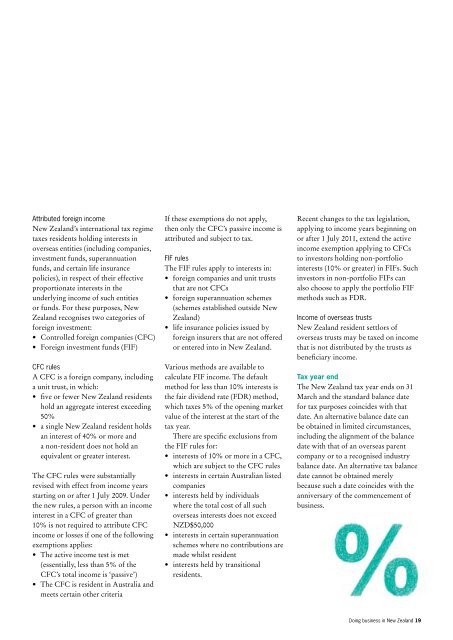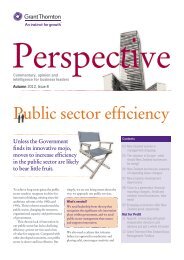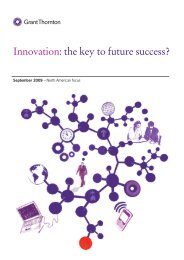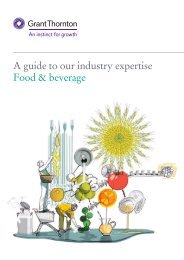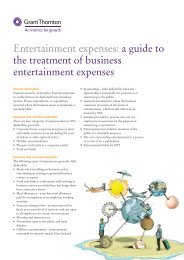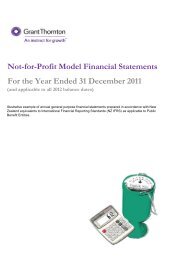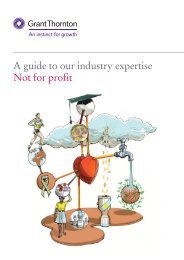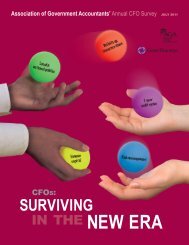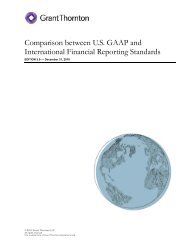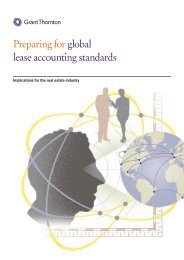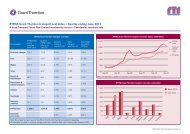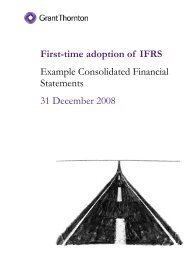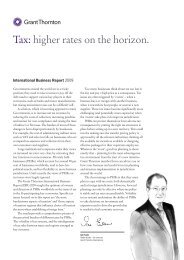Doing business in New Zealand - Grant Thornton
Doing business in New Zealand - Grant Thornton
Doing business in New Zealand - Grant Thornton
You also want an ePaper? Increase the reach of your titles
YUMPU automatically turns print PDFs into web optimized ePapers that Google loves.
Attributed foreign <strong>in</strong>come<br />
<strong>New</strong> <strong>Zealand</strong>’s <strong>in</strong>ternational tax regime<br />
taxes residents hold<strong>in</strong>g <strong>in</strong>terests <strong>in</strong><br />
overseas entities (<strong>in</strong>clud<strong>in</strong>g companies,<br />
<strong>in</strong>vestment funds, superannuation<br />
funds, and certa<strong>in</strong> life <strong>in</strong>surance<br />
policies), <strong>in</strong> respect of their effective<br />
proportionate <strong>in</strong>terests <strong>in</strong> the<br />
underly<strong>in</strong>g <strong>in</strong>come of such entities<br />
or funds. For these purposes, <strong>New</strong><br />
<strong>Zealand</strong> recognises two categories of<br />
foreign <strong>in</strong>vestment:<br />
• Controlled foreign companies (CFC)<br />
• Foreign <strong>in</strong>vestment funds (FIF)<br />
CFC rules<br />
A CFC is a foreign company, <strong>in</strong>clud<strong>in</strong>g<br />
a unit trust, <strong>in</strong> which:<br />
• five or fewer <strong>New</strong> <strong>Zealand</strong> residents<br />
hold an aggregate <strong>in</strong>terest exceed<strong>in</strong>g<br />
50%<br />
• a s<strong>in</strong>gle <strong>New</strong> <strong>Zealand</strong> resident holds<br />
an <strong>in</strong>terest of 40% or more and<br />
a non-resident does not hold an<br />
equivalent or greater <strong>in</strong>terest.<br />
The CFC rules were substantially<br />
revised with effect from <strong>in</strong>come years<br />
start<strong>in</strong>g on or after 1 July 2009. Under<br />
the new rules, a person with an <strong>in</strong>come<br />
<strong>in</strong>terest <strong>in</strong> a CFC of greater than<br />
10% is not required to attribute CFC<br />
<strong>in</strong>come or losses if one of the follow<strong>in</strong>g<br />
exemptions applies:<br />
• The active <strong>in</strong>come test is met<br />
(essentially, less than 5% of the<br />
CFC’s total <strong>in</strong>come is ‘passive’)<br />
• The CFC is resident <strong>in</strong> Australia and<br />
meets certa<strong>in</strong> other criteria<br />
If these exemptions do not apply,<br />
then only the CFC’s passive <strong>in</strong>come is<br />
attributed and subject to tax.<br />
FIF rules<br />
The FIF rules apply to <strong>in</strong>terests <strong>in</strong>:<br />
• foreign companies and unit trusts<br />
that are not CFCs<br />
• foreign superannuation schemes<br />
(schemes established outside <strong>New</strong><br />
<strong>Zealand</strong>)<br />
• life <strong>in</strong>surance policies issued by<br />
foreign <strong>in</strong>surers that are not offered<br />
or entered <strong>in</strong>to <strong>in</strong> <strong>New</strong> <strong>Zealand</strong>.<br />
Various methods are available to<br />
calculate FIF <strong>in</strong>come. The default<br />
method for less than 10% <strong>in</strong>terests is<br />
the fair dividend rate (FDR) method,<br />
which taxes 5% of the open<strong>in</strong>g market<br />
value of the <strong>in</strong>terest at the start of the<br />
tax year.<br />
There are specific exclusions from<br />
the FIF rules for:<br />
• <strong>in</strong>terests of 10% or more <strong>in</strong> a CFC,<br />
which are subject to the CFC rules<br />
• <strong>in</strong>terests <strong>in</strong> certa<strong>in</strong> Australian listed<br />
companies<br />
• <strong>in</strong>terests held by <strong>in</strong>dividuals<br />
where the total cost of all such<br />
overseas <strong>in</strong>terests does not exceed<br />
NZD$50,000<br />
• <strong>in</strong>terests <strong>in</strong> certa<strong>in</strong> superannuation<br />
schemes where no contributions are<br />
made whilst resident<br />
• <strong>in</strong>terests held by transitional<br />
residents.<br />
Recent changes to the tax legislation,<br />
apply<strong>in</strong>g to <strong>in</strong>come years beg<strong>in</strong>n<strong>in</strong>g on<br />
or after 1 July 2011, extend the active<br />
<strong>in</strong>come exemption apply<strong>in</strong>g to CFCs<br />
to <strong>in</strong>vestors hold<strong>in</strong>g non-portfolio<br />
<strong>in</strong>terests (10% or greater) <strong>in</strong> FIFs. Such<br />
<strong>in</strong>vestors <strong>in</strong> non-portfolio FIFs can<br />
also choose to apply the portfolio FIF<br />
methods such as FDR.<br />
Income of overseas trusts<br />
<strong>New</strong> <strong>Zealand</strong> resident settlors of<br />
overseas trusts may be taxed on <strong>in</strong>come<br />
that is not distributed by the trusts as<br />
beneficiary <strong>in</strong>come.<br />
Tax year end<br />
The <strong>New</strong> <strong>Zealand</strong> tax year ends on 31<br />
March and the standard balance date<br />
for tax purposes co<strong>in</strong>cides with that<br />
date. An alternative balance date can<br />
be obta<strong>in</strong>ed <strong>in</strong> limited circumstances,<br />
<strong>in</strong>clud<strong>in</strong>g the alignment of the balance<br />
date with that of an overseas parent<br />
company or to a recognised <strong>in</strong>dustry<br />
balance date. An alternative tax balance<br />
date cannot be obta<strong>in</strong>ed merely<br />
because such a date co<strong>in</strong>cides with the<br />
anniversary of the commencement of<br />
<strong>bus<strong>in</strong>ess</strong>.<br />
<strong>Do<strong>in</strong>g</strong> <strong>bus<strong>in</strong>ess</strong> <strong>in</strong> <strong>New</strong> <strong>Zealand</strong> 19


